Arsenio Molina Balisacan
President Ferdinand Marcos Jr’s pick as director general of the National Economic and Development Authority (NEDA) is Arsenio Balisacan, who also served as NEDA chief during the administration of President Benigno “Noynoy” S. Aquino III.
READ: Anti-trust chief to lead economic planning agency
Educational background
- BS Agriculture from Mariano Marcos State University (1979)
- MS Agricultural Economics from the University of the Philippines Los Baños (1982)
- PhD Economics from the University of Hawaii at Manoa (1985)
Work experience
- NEDA director general (2012 – 2016)
- Secretary of Socio-Economic Planning
- Board chairman of the Philippine Institute for Development Studies
- Chairperson of the Boards of the Philippine Statistics Authority and the Public-Private Partnership Center of the Philippines
- Dean of the University of the Philippines School of Economics (1995 – 2012)
- Director-chief executive of the Southeast Asian Regional Center for Graduate Study and Research in Agriculture (2003 – 2009)
- Undersecretary for Policy, Planning, and Research at the Department of Agriculture (January to March 2003; February to May 2001)
- Undersecretary for Policy and Planning at the DA (April 2000 – January 2001)
- Associate professor of Economics at UPD (1991 – 1995)
- Assistant professor of Economics at UPD (1988 – 1991)
- Economist at the World Bank (1976 – 1987)
- Research fellow at East-West Center (1985 – 1986)
Major achievements
Balisacan can take some of the credit for the Philippines’ notable economic performance during the Aquino administration. From 2010 to 2016, the country recorded a seven-year average economic growth of 6.2%, which is the Philippines’ fastest growth in 40 years.
Major programs
AmBisyon Natin 2040, a 25-year vision meant to guide the government in development planning.
The Marcos administration plans to adopt the plan, with President Rodrigo Duterte putting it into force through Executive Order No. 5, series of 2016.
Policy positions
‘Reinvigorate‘ public-private partnership projects
- The Philippines can’t go far without the private sector; Economic viability and sustainability of projects would be the primary consideration for PPPs
- Revive the manufacturing sector, which will help in poverty reduction
- Encourage investment in telecommunications, internet services
Address the education crisis
- The education crisis could hinder the country’s productivity
- Human capital needed
On tax reform
- Taxes shouldn’t come at the expense of the vulnerable and those who have more needs in life.








